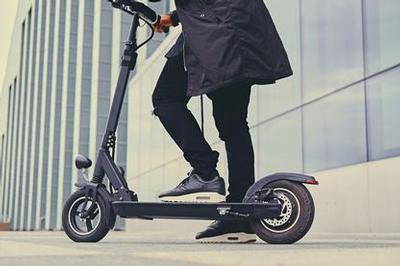
The City of Portland just opened its application process for a four-month Shared Electric Scooter Pilot Program.
PBOT says the total number of e-scooters allowed in the city will be capped at 2,500 and there will be a requirement that companies deploy 20 percent of the fleet in east Portland (as defined here). Top speed will be limited to 15 mph.
Here’s more from the announcement:
Throughout the Pilot Program, Shared Scooter companies will be expected to report on and mitigate impacts in several areas of concern. These include (but are not limited to): Safety and access for people walking, safety and access for people with disabilities and compliance with state law (including helmet requirements and the prohibition on sidewalk riding).
Through public engagement and program evaluation, City officials will determine whether and under what circumstances electric scooter sharing may be permitted to continue operating in the public right-of-way after the Pilot Program has ended. The bureau will use anonymized trip data analysis, user surveys, and intercept surveys to understand the potential benefits and burdens of e-scooter operations in Portland in relation to the City’s equity, mobility, and climate action goals.
Advertisement
[pdf-embedder url=”https://bikeportland.org/wp-content/uploads/2018/07/scooter-share-application.pdf”]
During the pilot, PBOT will gather data from surveys, focus groups, a complaint hotline and more. They’ll be trying to assess whether the micro-mobility devices reduce auto use and congestion, improve street safety, expand mobility options for underserved communities and reduce air pollution.
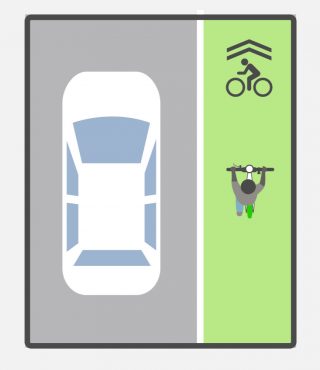
It will cost each company $250 to apply and $2,500 for the permit if they’re selected. PBOT will also charge a 25-cent per-trip surcharge. The scooters will hit the streets July 23rd and the pilot program will end on November 20th.
The scooters are illegal to use on sidewalks and they’ll be a new presence in Portland bike lanes. The devices will be dockless, meaning users won’t have to park them in specific spots.
In the 36-page application packet, PBOT clarifies to potential operators that as per Portland City Code section 17.44.010 A: “It is unlawful for any person to obstruct or cause to be obstructed any roadway, curb or sidewalk by leaving or placing, any object, material or article which may prevent free passage over any part of such street or sidewalk area.” There’s also this daunting list of where scooters cannot be parked:
In order to earn a permit, PBOT is requiring operators to notify users that helmets are mandatory.
Learn more on PBOT’s website.
— Jonathan Maus: (503) 706-8804, @jonathan_maus on Twitter and jonathan@bikeportland.org
Never miss a story. Sign-up for the daily BP Headlines email.
BikePortland needs your support.



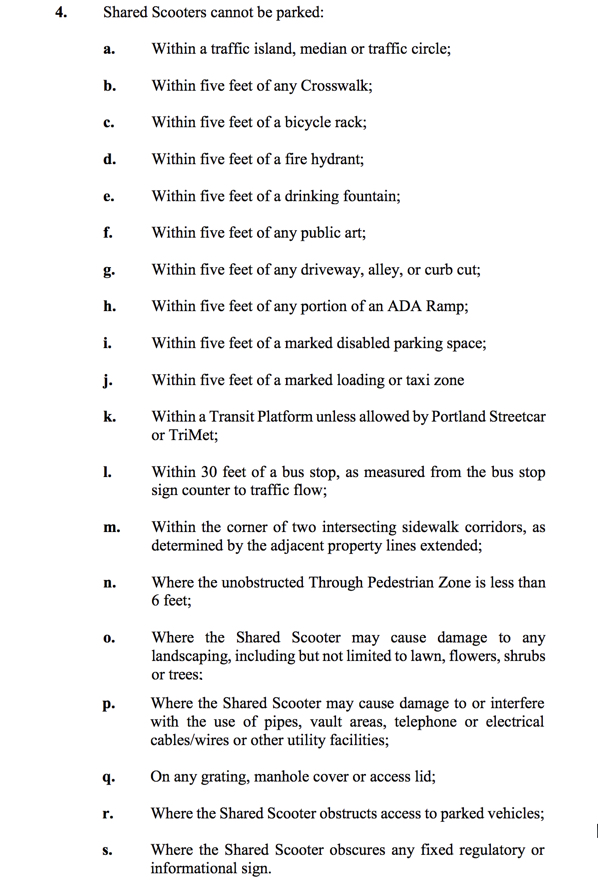

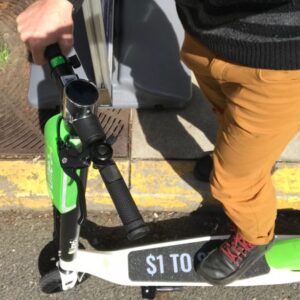

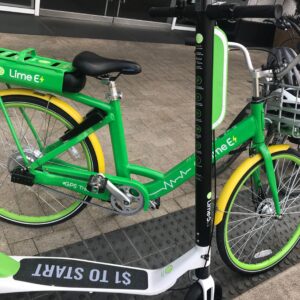
Thanks for reading.
BikePortland has served this community with independent community journalism since 2005. We rely on subscriptions from readers like you to survive. Your financial support is vital in keeping this valuable resource alive and well.
Please subscribe today to strengthen and expand our work.
http://www.wweek.com/news/business/2018/06/05/i-just-lived-through-the-invasion-of-san-francisco-by-electronic-scooters-portland-you-have-no-idea-what-youre-in-for/
It’ll be fine.
What is “anonymizing” in fact?
It’s just a database of trip attributes (start and end locations, route, length, etc) without personal information.
To whom do we report sidewalk riding and the inevitable parking infractions? Different offices, I assume.
To which office do we report in order to be roundly ignored. There is no way pop or anyone elade is going to respond to a scooter scofflaw unless maybe it’s a gang of scooters with machetes.
Where do you report motor vehicles speeding, running red lights, etc?
I’m sure the city will provide a “One Point of Contact” web form and assure us that “it’s a complicated problem”
Shared scooters are not to be parked within 5 feet of a crosswalk or curb cut? This reminds me of something, something, can’t think of it. Dang. Never get old!
If parking compliance failure means a thing can be banished from the city where are cars?
ORS 811.550(17)
It’s time.
Well hey, since this one vehicle wasn’t taken out and blown up let’s just give up and allow anything? Why not focus on getting better enforcement rather than anarchy.
I guess the parking spots will be a geographical oddity, 5 feet from anywhere.
As I expected, the City has prohibited the most logical and equitable place for scooters to be parked: in space currently used for motor vehicle parking. (I looked in the application, and scooters must be parked in the “sidewalk corridor.”)
This strikes me as a completely ridiculous decision that is likely to stoke resentment of the scooters due to them blocking the sidewalk. “Scooter corrals” replacing car parking that have little curb things to keep people from driving in them (like the bike corrals do) seem like the best possible solution. Against the rules. Everyone not in cars needs to fight for scraps of space… Again.
“User Education: Describe your plan to educate and encourage user compliance with all applicable laws, including… prohibition of sidewalk riding”
With bikes, we have obvious places to park them (bike racks), and obvious places to ride them (bike lanes).
The scooter presents a huge user experience problem, both for riders and pedestrians.
In UX terms, there are zero affordances for how the object is supposed to be used.
Instead, we’re hoping a few instructions can overcome the enormous design problem: somehow, with zero cues, users must know to park these objects in something planners (but no one else) calls a “furnishing zone”, while operating them in what looks like a motor vehicle or bicycle lane (vs the space in which these things are found – the sidewalk).
It seems the obvious solution is to not introduce these things willy nilly and then shout out “user error!” when scooter users can’t figure out where they go, but instead start with really strong affordances, like scooter corrals (or mini corrals on corners, additionally serving pedestrians by increasing protection, like a curb bulb out). By putting parking on-street, you signal these should be used on-street.
Or: “You are about to do something illegal and dangerous. By swiping your card you waive all rights and you can’t sue anybody. Chill the FO.” This is of course facetious but it makes just as much sense as all that other verbiage. We can’t stop starlings and we woke up in bed with Uber. Why pretend that we can tell people where to park a scooter?
The parking rules seem so complex as to be unenforceable. Maybe they should require every cannabis dispensary to provide scooter parking. 😉
It appears that there will be very few places where scooters can be legally parked. I hope PBOT develops a phone app we can use to report illegally and dangerously parked scooters. I hope it’s much better than the illegal parking phone line.
Yes what a valuable use of resources to address a problem that any able body person could immediately correct when they see it.
Considering that every article I’ve read mentions that people have been throwing scooters into bushes, lakes, the ocean, etc… I expect to see our share of that.
It’s also illegal to ride these in a crosswalk. So if you’re on a bike path that crosses a road you’ll need to dismount.
Or, be preceded by a person carrying a red flag?
While the trend toward mobility solutions that rely on fleets of electric/electronic/internet-connected wheeled objects owned by private companies, summoned via smart phones is in full swing, fashionable, sexy, makes us feel cutting edge, is it conceivable that net reductions in our transportation footprint from these efforts will be negligible? That they aren’t in fact providing anything like a meaningful climate benefit?
I worry that in our breathless and wishful embrace of whatever the newest gadget is we are not asking some important questions. It isn’t as if we hadn’t been disappointed before.
CAFE standards didn’t reduce total per capita fuel consumption;
Curbside recycling hasn’t corresponded with declines in per capita municipal solid waste;
Energy efficiency hasn’t, by and large, yielded declines in per capita energy consumption.
We predictably refuse to design policies that tackle the actual problem (too much), but deploy strategies that identify and then seek to tackle a second order phenomenon (energy efficiency, lbs recycled, mpg). As such we may (and sometimes do) win the second order battle, while losing the first order war. Notwithstanding narrowly measured successes, our ecological footprints keep getting bigger, population keeps going up, and the problems all of these strategies were ostensibly meant to reduce continue to get worse. What we need are absolute reductions in–no let me restate that: we need a complete cessation of–fossil fuel use, not some fiddling around with fleets of sexy gadgets.
I’m curious. Given all that, which I did read, do you support a price on CO2? With the level to be set in the usual messy way?
A carbon tax or a fee and dividend approach strike me as useful strategies. Of course with the price set low enough (likely) this will almost certainly be too little too late, but with the mechanism in place the ability to ramp up the tax would be in principle doable as we start to realize how screwed we are.
“we need a complete cessation of–fossil fuel use”
global fossil fuel use is *increasing* and USAnian public concern about climate change is decreasing.
Yes…?
perhaps an abolitionist position is not the best strategy to effect political change. one can be an abolitionist while promoting welfarist transitional demands.
I suppose someone could, but I am not persuaded that the incrementalist, Middle-Class-taste-flattering, no-feather-ruffling, capitalism-compatible approaches we’ve all gotten used to are helping us gain on these problems. So why would I be in favor of them?
Or did I misunderstand what you are saying?
What are welfarist transitional demands?
definitely a misunderstanding.
https://en.wikipedia.org/wiki/Transitional_demand
The important part here is that the venture capitalists who back Bird, Lime, etc., get to make huge profits when they’re absorbed by the bigger venture capitalists behind Uber, Lyft / Motivate, etc. Call it greenwashing if you want, but the 1% will keep asking Portland City Hall to bend over backwards as long as there’s money left to be mined from an uneducated public.
But Seattle banned the plastic straw!
Plus, how does standing on a motorized scooter qualify as active, healthy transportation?
Perhaps they were thinking of the wind in your hair as healthful?
Walking is healthful!
For now, but looking around it appears that human legs are well on their way to becoming vestigial organs with no known function.
ORS 811.550 limits vehical parking within 20 feet of most intersections. For scooters its 5. That leaves a 15 foot space at many intersections where scooters could be parked in street parking. This would be better than parking on the sidewalk and would daylight intersections.
We’d likely lose too much equipment this way. Drivers cutting the corner or attempting to park would run over racks/bikes/scooters, then sue the city for damage to their vehicles.
XD Ugh… Funny because it’s true.
I have to wonder – what about liability reform at the State level to make it clear that government agencies in charge of roads are NOT liable for vehicle damage related to road conditions, but ARE liable for human injuries/deaths related to road conditions? Would it have a positive and transformative impact on our roads? (Yes, there would also have to be a clause saying that prohibiting bike/pedestrian use is not OK except in limited circumstances X Y and Z)
Wow, did anyone check out the data the city looks to collect as a requirement? This is great:
* Trip origin/destination lat/lon
* Trip route
* Trip maximum and average speeds
Note that:
“The data collected by the City will be, except as otherwise required by law or
aggregated, kept confidential by the City, used only within the.”
(Typo theirs. Perhaps a good balance between protecting privacy and getting necessary data for policy evaluation.)
Does the city require this data of TNCs (Lyft & Uber)? Imagine if we had that plus vehicle make/model/year – we could calculate climate impacts of these systems.
I might have missed it, but it seems there’s a large gap in this proposal:
“Limitations on Shared Scooter Parking.
1. Shared Scooters must be parked in the Sidewalk Corridor …”
I didn’t see any requirement that the scooters have kickstands or other mechanisms to stand upright. Seems like you’ll end up with these cluttering the sidewalk if there’s not easy way to park them.
SF has figured that out in their application permit:
“31. Shared Powered Scooters shall be parked standing upright and outside the path of travel in the furnishing zone. The SFMTA will provide detailed specifications to clarify existing City
regulations prohibiting obstruction of the right of way. The Permittee shall instruct
customers how to park a Powered Scooter properly.”
https://www.sfmta.com/sites/default/files/reports-and-documents/2018/05/powered_scooter_share_program_permit_application.pdf
For a while I was considering getting a folding scooter to speed up my bus commute at the time. I’d like to try out some kind of electric scooter share but I’m not interested in carrying my helmet around just in case I decide to ride a scooter. Will these things do 15 mph uphill on the Tilikum?
If you own and ride your personal bike the City can neither “aggregate” nor “annoymize” you.
+1 for personal bikes, yes.
That said, the city aggregates anonymous ridership data from you every time you bike across the Hawthorne Bridge (past the bike counter).
Helmets are required for electric scooters. I believe Oregon law is that helmets have to be provided at the time and place of rental. How are these laws going to be fulfilled?
It’s sad that we require helmets for anything with a motor except for cars. I suspect that if car-addicts didn’t have to walk to and from their cars we would require pedestrians to wear helmets too.
Hopefully, these laws will be ignored as are many laws that target active transportation from a position of car-centric bias.
Did Portland just exclude Kenton, Delta Park, PIR, Expo Center, Bridgetown, Hayden Island, Kelly Point Park and PDX? It appears as if the The City is more concerned about protecting their own Biketown revenue stream than providing universal service. As a Hayden Island resident with no car (and no local grocery store), I was looking forward to scooters. Now it looks like I’ll have to buy a car and add to the congestion.
Good point. But, if scooter use goes right up to the border maybe they’ll take the hint.
The city finally threw E Portland a bone, 20% of the scooter fleet. Or is it a poison pill for applicants? Imagine cruising out there for scooters to charge. One fourth as many machines in three times the area.
Where are you reading that?
Skimming the documents, I only see a requirement that 20% of scooters be deployed to East Portland, and that the scooters deployed in the central city be rebalanced daily to be near existing bike faciilities. I don’t see an exclusion of scooters from any area of the city, but maybe I missed something?
E-scooters are picked up and recharged every night or so, and the people doing that (“juicers”) are told where to place each charged scooter in the morning. So the operator can, in theory, control where the scooters are deployed each morning. It can’t realistically control where each scooter gets ridden to during the day. I suppose the scooters could have some geofencing feature but I’ve not heard of that.
Portland might use software like Replica to track anonymous trip data.
https://sidewalklabs.com/blog/introducing-replica-a-next-generation-urban-planning-tool/
BTW, a Bike-Share API is available that allows you to query over 65 dockless and docked bike-share systems across the country through a single API.
https://medium.com/coord/one-bike-two-bike-red-bike-blue-bike-84dc0ade6abe
But I was hoping for a “white box” solution where local bike stores (and individuals) could run neighborhood bike/scooter sharing systems. Owned and operated locally. Is that wishful thinking or is it a practical alternative.
I realize that billions of venture capital dollars are flowing into scooter sharing and Portland has a tricky situation. But I prefer more local and neighborhood control.
http://www.hayden-island.com/biking
I don’t understand why we would limit the number of scooters to only 2500. There are 1000 biketown bikes and the service area is much smaller. Can you imagine if they tried to cap the number of cars that were allowed to be inside the city limits? The only thing a cap will do is make the system less useful.
What about a surcharge per car? Say $10,000?